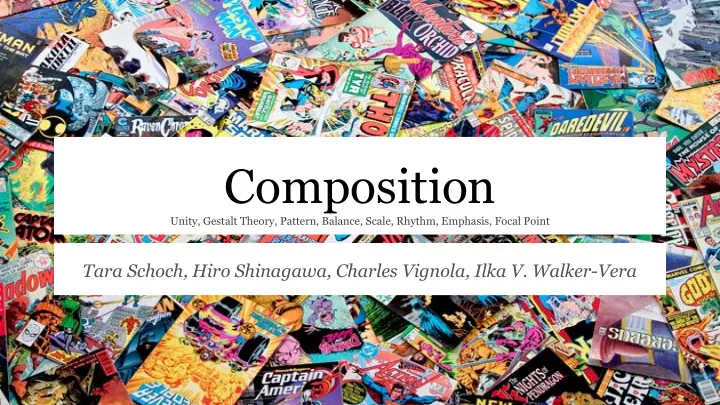

Composition Unity, Gestalt Theory, Pattern, Balance, Scale, Rhythm, Emphasis, Focal Point Tara Schoch, Hiro Shinagawa, Charles Vignola, Ilka V. Walker-Vera
Unity and Variety Unity - Similarity Variety - Difference - Must be a Balance between the two but Together they make a cohesive and lively composition
Gestalt Theory - The Theory that Visual Information is understood holistically before it is examined separately. Bigger Picture Closer Detail
The 6 Essential Aspects 1) Grouping 2) Containment 3) Repetition 4) Proximity 5) Continuity 6) Closure
Patterns Grids the repetition of any created through a series of visual element intersecting lines
Balance The distribution of weight or force within a composition. - Weight and Gravity - Symmetrical Balance - Radial Symmetry - Asymmetrical Balance - Expressive Use of Balance
Weight Symmetrical Balance and Gravity Symmetrical Approximate Balance Symmetry same similar
Asymmetri Expressive Radial cal Uses of Symmetry Balance Balance
Scale The size of a visual medium relative to the size of a human.
The size of the heads pictured here are normal relative to each other, but small to a human, as is seen by the largeness of the hand holding the bases.
The faucet pictured is large scale, meaning it is larger than it normally would be relative to the size of a person.
Rhythm Using repetition in visual mediums in order to create the illusion of movement.
The repeating image, but varying distance from the focal point, gives the image the illusion that it is moving.
Emphasis: attention and increase visual and conceptual impact isolation - Focal point: compositional device - Emphasis: visual elements - Anomaly: break from norm placement - centricity: compressive compositional force - eccentricity: expansive compositional force
anomaly
Centricity and Eccentricity
Contrast: 2 or more forces operating in opposition Three types: - scale - shape - color
contrast in scale
contrast in shape
contrast in color
Recommend
More recommend